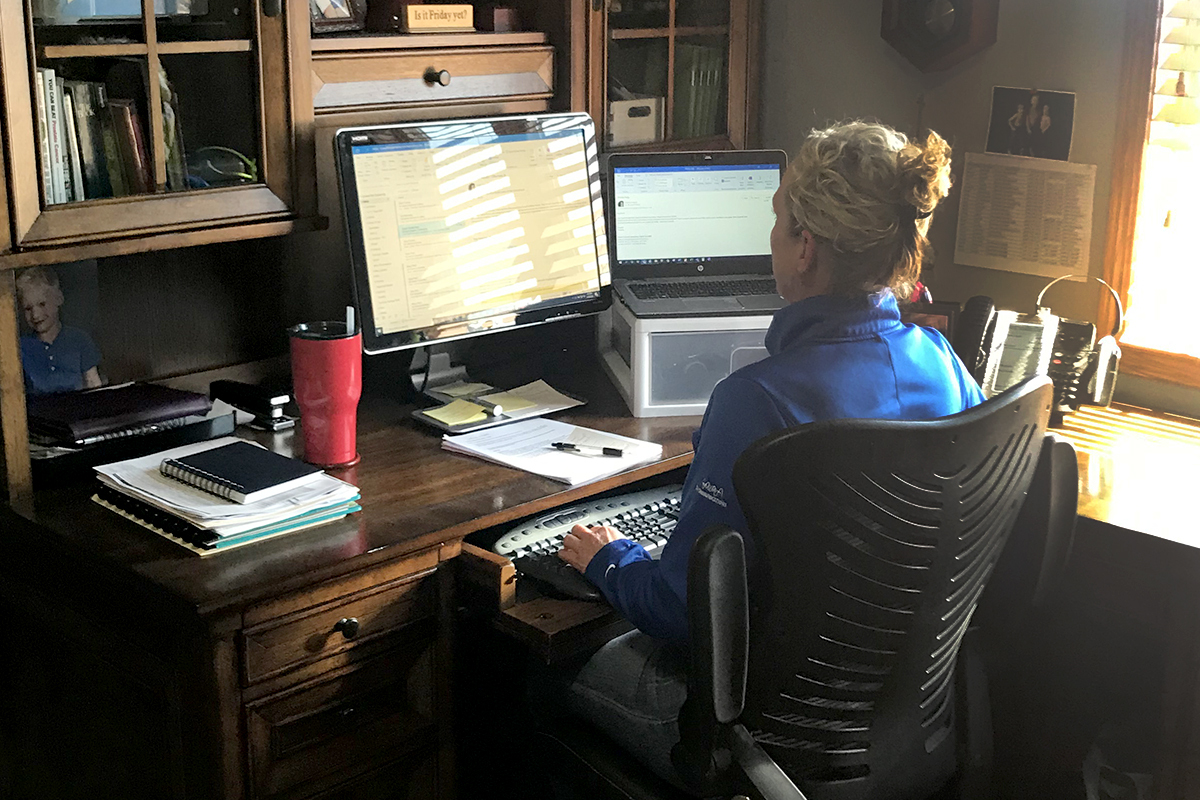
A lot of companies in the Sioux Falls region are following the guidance of state and national healthcare experts to help slow the rapid spread of Covid-19. One of the most significant steps businesses have taken is to ask employees who can work from home to do so.
The number of newly created, remote workers is probably much higher than many businesses had expected. The duration of their staff members’ remote deployment could be longer than expected, too.
Sending employees home to work can create challenges for employers as well as the staff members. Some of the most basic questions pertaining to the quality and readiness of the electronic network that a home-based employee will use, according to Jake VanDewater, vice president of engineering, operations and IT for SDN Communications in Sioux Falls.
“The first step is confirming the capacity and current state of that individual’s home network,” VanDewater said. “Basically, is the capacity of their home network ready for them to work for home?”
With schools closed and children studying at home, the burden on residential internet systems could be especially heavy.
“We all kind of shop based on price. If we’re buying minimum bandwidth from our service provider, the question comes up of whether that is going to be adequate as we start using more and more services from home,” VanDewater said.
A home-based employee might have to call or email his or her internet service provider to find out whether their home system needs more capacity. To figure that out, the ISP might ask additional questions or have the customer perform an online speedtest.
The privacy and security of network connections also can be a concern for companies. SDN has recently helped several business customers extend their virtual private networks. VPNs enable users to send and receive data on public networks as if they were directly connected to a private network.
“We’ve performed a number of VPN additions and set-ups for customers and also bandwidth upgrades. Workers are remote, but they’re still connecting back to that main office and sending traffic in and out of that network,” VanDewater said.
To help enhance network security and performance, businesses should limit traffic on VPNs to essential business traffic, he said. Employees should not be streaming movies for entertainment over a private network.
The needs were a little different for First Farmer’s & Merchants Bank. The Minnesota-based bank with 16 locations urgently needed more tokens for single-sign-on security access for employees working from home. Those token orders typically take two weeks, but SDN staff, anticipating the need, pre-ordered them and accommodated FFM’s request almost immediately.
More than amazing, I emailed our account person, Mary Pfaff, Sunday evening. First thing Monday morning, she had them installed on our firewall. I’m super impressed that SDN had the foresight to go buy extra because they knew customers were going to need them. Exceptional customer service.
A lot of SDN employees, like those from many other businesses, are also working from home. People essential to network operations continue to work on-site, however.
Sioux Falls-based SDN primarily serves businesses and government institutions in the Sioux Falls area and across the region. (SDN does not directly serve residential customers.) However, it provides internet connectivity for most of the independent phone companies that serve South Dakota. Those companies are SDN member-owners.

SDN and its member companies prepare for broadband demands in the future, anticipate growing demand and monitor their networks constantly in case changes need to be made along the way, VanDewater said.
“From SDN’s perspective, we’re prepared for those peaks and increases. The work we’re doing right now is for next year’s peak. We’re forecasting the growth of our network a year out,” he said.
For SDN, the current pandemic is similar to situations such as blizzards. Suddenly, a lot of people are have been confined to their homes and want access to the internet for work, everyday use or play. People and businesses ultimately served by SDN can take comfort in knowing that the overall capacity of the company’s network is not a concern.
Although a new high in broadband consumption was reached earlier this month (March), consumption remains well below the capacity of the network, VanDewater said.
“We’ve noticed a change as far as the pattern of usage but not a major change in the overall peak, at this time,” he said. “We’re seeing higher, more consistent usage early on and throughout the day. We haven’t seen a major increase in peak usage.”
Generally, businesses should expect to need more broadband capacity in the future, and plan for it, VanDewater suggests. A business shouldn’t wait until it hits an artificial limit a limit to expand.
“We have a lot of people counting on us in varying industries. They need their internet and their network connectivity. So we’re making sure we have the right network resources in place to support that,” he said.
SDN is delivering on many requests from organizations seeking increased bandwidth and tools to accommodate workers and students remaining productive from home. A few more examples:
- Plains Commerce Bank – This financial institution asked SDN to help enable work from home (WFH) connectivity through secure Virtual Private Networks (VPNs) on an SDN managed firewall. SDN accommodated and bank employees started adjusting last week.
- Bishop O’Gorman Catholic Schools – SDN assisted the private school system by adding technology for single-sign-on security access and age-appropriate web filtering for student Chromebooks so they can learn from home, plus VPNs for staff WFH.
- City of Sioux Falls – All non-essential municipal offices have closed and moved to a WFH environment, but the city remains the hub of information for citizens. To accommodate, SDN worked with the state of South Dakota to increase the city’s core connectivity by five times.
SDN is a leader in providing business internet, private networking and cloud connectivity to businesses and organizations in communities such as Sioux Falls, Rapid City, Worthington, and the surrounding areas.




